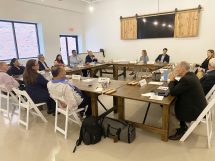Put a sensible tool for growth in Kentucky voters’ hands

By Dick Kelly
As state and local governments continue to struggle in a “slow growth” economy, forward thinking individuals continue to look for new and creative ways to fund projects designed to enhance the quality of life or contribute to positive economic development and growth. In Kentucky, there is much debate regarding the Local Option Sales Tax, which is a reasonable tool to give voters in our counties and municipalities.
Local Option Sales Tax is a mechanism to raise funds for a specific project only by adding a maximum of 1 percent to the base sales tax rate in a specific political jurisdiction for a predetermined length of time. All the money it generates is dedicated to the project and cannot be shifted to any general fund. Some items like food, medicine, utilities, automobiles and farm equipment would be excluded from the sales tax. While 1 cent on the dollar is the maximum, it can be applied in fractions: a quarter-cent is commonly used levy.
On the surface, the concept is a simple one that allows the residents of Kentucky communities to determine the desirability of a project, the merits of the proposed funding, and vote “Yes” or “No” whether or not to levy the incremental tax increase – Democracy in its purist form. A deeper analysis reveals a few potential complications cited by opponents.
Detractors of the concept use the acronym LOST for Local Option Sales Tax, while proponents prefer LIFT for Local Investments For Transformation. Looking at both sides, even the opponents admit to the glaring need for increased revenues for improved infrastructure and capital projects, but feel the option produces a proportionally heavier burden on those at the lower end of the economic scale. Likewise, the retail sector feels the tax would raise the cost of products, thereby reducing their ability to compete and would generate extra operating expense in the collection process.
To add complexity to the discussion, adopting this measure would require a change to the state’s constitution. Its provisions require that a local taxing proposal has to be approved by a 60 percent majority in both Kentucky state legislative chambers. Then, to become an Amendment to the state constitution, a majority of voting public would have to approve the measure in a subsequent general election.
To date, there are 37 states that utilize the Local Option Sales Tax. Kentucky’s adjacent neighbors Ohio and Tennessee boast vibrant economies and use the LIFT option, while West Virginia and Indiana do not. Nationally, notable examples of very successful implementations are cited in Denver for a light-rail system and in Oklahoma City for a canal district. The commonwealth LIFT initiative website contains no less than 40 Kentucky counties with suggested projects designed to enhance the communities and provide economic development opportunities:
- Pike County – Construction of Health & Wellness Center
- Jefferson County – Facility for Homeless Veterans
- Fayette County – Restore & Repurpose Historic Court House
- Kenton County – Revitalize & Expand Convention Center
- Pulaski County – Build Long Term Camping Facility
- Barren County – Construct Waterpark
- Henderson County – Update 911 Emergency System
- Boyle County – Construct Farmers Market
There is strong bipartisan support for moving forward with the Local Option Sales Tax in Kentucky. Some very good discussion took place around this year’s General Session and although the bill did not pass, a great deal of progress was made. Some discussion argues that, going forward, this tool should be discussed within the larger subject of comprehensive tax reform. Unfortunately, while nearly everyone agrees on the need for comprehensive tax reform in theory, in practice no one is willing to propose and push a specific plan – this is a decades-old political status quo.
As Voltaire wisely advised: “Don’t let perfect be the enemy of good.”
Local Option Sales Tax is an idea that merits presentation to Kentucky voters as a proposed constitutional amendment. ■
Dick Kelly is publisher of The Lane Report. He can be reached at [email protected].




















Add Comment